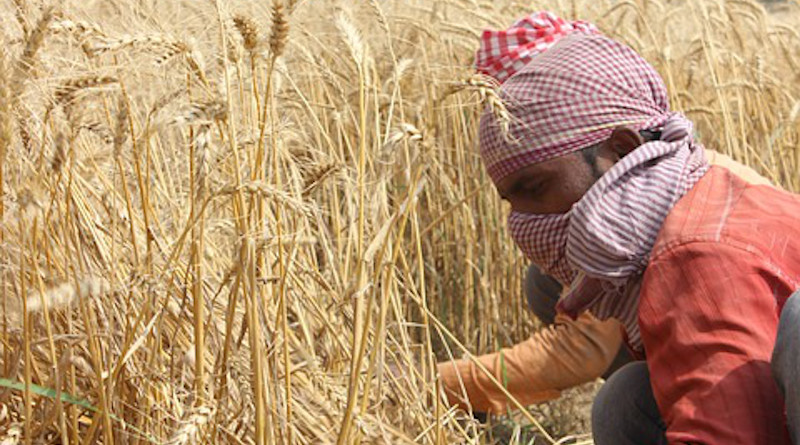Farm Sovereignty: A Natural Right Of Punjab – OpEd
Agriculture is a business of asymmetrical risks. Besides microeconomic competitive risks, volatility in agricultural commodity prices come from macro-economic factors such as inflation, transportation costs, international trade and not to mention anti-farm politics. The market can’t always price risks to predict and continuity of revenues for farmers especially in the case of South Asia. Various farming models have been proposed, policies implemented to improve market dynamics and sustain agriculture as productive and profitable business in both developed and developing countries- some proving vital to farming while others ending up with disastrous consequences for farmers.
The anti-farm bill passed by the Bhartiya Janta Party (BJP) regime of India is one of the nightmarish disasters taking place. The anti-farm bill was passed without formal debate and voting. The bill has unilaterally and undemocratically withdrawn price floor for many of the grain producers in India in middle of a pandemic.
India has approximately 70% of population that relies on income from agriculture with states of Punjab and Haryana constituting the bulk of their economies on agriculture. Average farm sizes are less than 10 acres in Punjab and Haryana. The BJP regime, a Hindu fascist-nationalist regime with the aim of establishing authoritarian exploitation, has once again maliciously targeted the most vulnerable economic sector with its draconian anti-farm politics. Without any agricultural price support, the small-scale farmers in Punjab and elsewhere are going to be sitting ducks to unbridled and crooked India companies largely backed by the BJP regime itself.
Bonded Farming
India doesn’t have an effective business law or regulatory bodies to ensure price fairness to farmers, let alone basic human rights for farmers. According to global slavery index, India ranks 4th in number of slaves with 19 million enslaved- many of them in debt bondage. Debt bondage is a thriving industry in Punjab. In India as well, bonded farming is depravedly sustained by unscrupulous moneylenders and brokers who can charge predatory lending rates to small-scale farmers. The national banks of India don’t even support the farmers in providing affordable loans. The farmers are made captives in a cruel system of debt bondage, with no accountability. In fact, farmers are twice as likely to commit suicide than those who are not farmers in India because of their perpetual debt enslavement. All of this is further sustained within the ancient practices of caste system, financially subjugating farmers as the sub-human Shudhras (the caste-slaves) of upper-castes.
By removing price floor and without any accountability, unscrupulous privatized parties can create disproportionate price dynamics against the interests of small scale farmers. The BJP regime is on its way to make farming captive to its exploitative and destructive nexus.
Market Sovereignty
It is the duty of a legitimate government to represent interests of its people and create equitable market dynamics that discourage exploitation and prohibit debt enslavement. Punjab government and other state governments must resolve to protect the natural rights of farmers. People of Punjab should have the liberty to decide their rights as well as their own farm policy.
For a commodity based economy like Punjab and Haryana, it is important for the society to create farming models that can deleverage the risks in farming while allowing farming to become a sustainable market power. One solution is to establish a state backed food and farm sovereignty policy. Under the policy, the states of Punjab and Haryana could establish a government backed Farm/Grains Board that acts as both the buyer and marketing arm of states’ grains, conferred with the mandate to negotiate with the transportation companies, storage companies and the final buyers to ensure an effective pricing mechanism. In fact, such a Board can achieve economies of scale by incorporating storage and transportation operations. This arrangement will generate a market power having the trading leverage to achieve favorable price objectives.
As a market power, the farm board can have the ability to give farmers a guaranteed price while reducing the price risk through effective risk management. No more the farmers will have to deal with middlemen and corrupt broker-agents to sell their grains. The Farm Board shall keep the additional profits earned from selling of produce in its reserves to cover the payments to farmers during the periods of economic distress. Any further losses should be backed by the state taxpayers. Economic pooling of cooperative resources will result in creating a comparable marketplace that is able to achieve favorable market dynamics while ensuring economic rights of farmers are lawfully defended from an unconscionable system of farm enslavement.


The author is as far away from reality as from Punjab.
Which bonded labour is he talking about? Must be of talking of his ancestors.
The root cause of agrarian crises in India is it being shackled in the vice like grip of middlemen.
What government has done is just right.